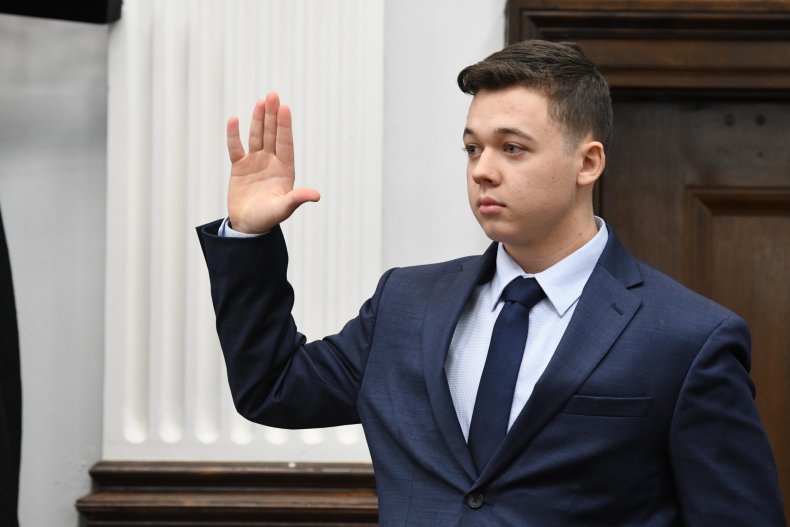Kyle Rittenhouse Prosecution 'Scored Major Points' in Their Closing Arguments
The prosecution strengthened their case to get a conviction against Kyle Rittenhouse following their convincing closing arguments in the trial, a legal expert has said.
The jury is set to start deliberating on his homicide charges after hearing hours of closing arguments from the defense and prosecution on Monday.
The focus of the trial is on whether the then 17-year-old defendant was acting in self-defense when he shot and killed Joseph Rosenbaum and Anthony Huber, before injuring Gaige Grosskreutz, during the Black Lives Matter protests in Kenosha, Wisconsin in August 2020.
In his closing argument, lead prosecutor Thomas Binger accused Rittenhouse of being a "chaos tourist" who traveled to Kenosha from his hometown of Antioch, Illinois, in order to initiate violence, noting how he was the only person to shoot anyone during the protests.
"You cannot claim self-defense against a danger you create. If you're the one threatening others, you lose the right to claim self-defense." Binger told the jury.
Los Angeles civil rights attorney V. James DeSimone told Newsweek that while much of the trial seemed to have gone in Rittenhouse's favor, the 18-year-old could still be convicted over the shooting of Rosenbaum as he fired at him four times.
"The prosecution scored major points in closing arguments by emphasizing that each of the four shots Rittenhouse fired to kill Joseph Rosenbaum had to be in self-defense," DeSimone said.
"Once Rittenhouse's shot fractured Rosenbaum's pelvis, there was no threat to Rittenhouse at all. The defense's excuse that the bullets were fired rapidly is no excuse and Rittenhouse's lawyer really lost an opportunity by barely mentioning 'reasonable doubt.'
"Based on the closing arguments, the jury should at least convict on reckless homicide or reckless endangerment," DeSimone added.
Binger also suggested that after Rittenhouse repeatedly shot the unarmed Rosenbaum, others who were in Kenosha that night had the right to defend themselves from what they reasonably thought was an active shooter.
The prosecution said that Rittenhouse therefore had no right to kill Huber, who attacked the defendant with a skateboard after he fell to the ground while being chased through the street, or fire at Grosskreutz immediately afterwards.
In his closing argument, defense attorney Mark Richards dismissed suggestions that Rosenbaum did not pose a threat to Rittenhouse.
"Mr. Rosenbaum was shot because he was chasing my client because he was going to kill him," Richards added. "Take his gun and carry out the threats he made."
Richards added Rittenhouse only shot at people that night who were either attacking the defendant or pointing their gun at him.
In a statement to Newsweek, Matthew Barhoma, a Los Angeles criminal appeals attorney and founder of Barhoma Law, said the prosecution did not put up a strong enough case for the jury to convict Rittenhouse of homicide.
"What prosecutors are trying to do, by rhetorically asking if a crowd should not be able to disarm a gunman who's just shot someone, is place all of Kyle Rittenhouse's action in a vacuum and get the jury to ignore what was happening when Rittenhouse opened fire," Barhoma said.
"The way self-defense works, you have to look at the exact moments when a shooting occurred. Someone coming at you with a skateboard and trying to take your gun, that's an imminent threat.
"What is Rittenhouse supposed to think Huber or Rosenbaum is going to do after either of them disarms him? It's reasonable to think they'd turn the gun on him."
Barhoma also suggested that the prosecution made a mistake when it charged Rittenhouse with the intentional homicide of Huber, given he was seen attacking the defendant before he fired.
"They should have just charged him with reckless homicide for that death, because it would have been so much neater and cleaner for their case given the state of the evidence. Instead, they have to rely on that reckless homicide charge as a backstop."
Joe Lopez, a Chicago-based lawyer, said the prosecution effectively showed that Rittenhouse may have been an instigator of the violence that night, including showing video of him pointing his semiautomatic rifle at demonstrators.
"This is a guy who came with special bullets and a gun, who came up to Kenosha with a gun to shoot someone," Lopez told The Associated Press. "I think the prosecutor effectively made that point."
Steve Greenberg, another Chicago-based lawyer, said overall the defense had "better facts" than the prosecution.
Greenberg also said the defense gave a convincing argument that Rosenbaum was a potential threat to Rittenhouse by telling the jury that Rosenbaum was under treatment for bipolar disorder and depression and more likely to behave erratically and attempt to take the defendant's gun from him.
However, both Lopez and Greenberg said that the strength of the closing arguments following two weeks of testimony may not overtly persuade the jury either way.
"I don't think many cases are ever won in closings," Greenberg said. "Jurors go back to the juror room and talk it all out amongst themselves."


